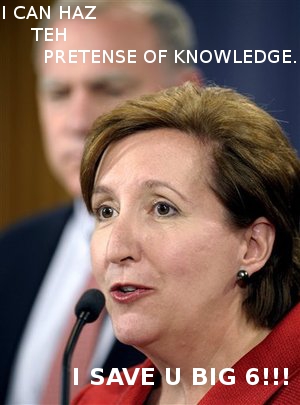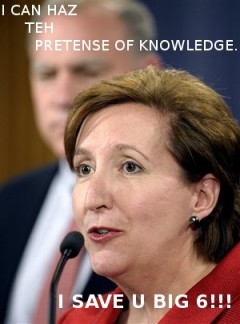
Jeffrey Tucker recently discussed the Department of Justice’s decided to launch antitrust litigation against Apple and five of the Big Six publishers — Hachette, HarperCollins, Macmillan, Penguin, and Simon & Schuster, but not Random House — for alleged price fixing. Three of them — Hachette, HarperCollins, and Simon & Schuster — decided on the same day to settle straight away. The alleged sin was that Apple and the publishers decided to go with the agency pricing model in which the publishers get to set the prices for their books in the iBooks Store, while Apple takes a 30% cut.
As you’d expect, I’m with Jeffrey Tucker in believing that price fixing, collusion, cartels should not be illegal. In a free market, these practices are not stable and will end up harming the companies in the long run if they dissatisfy customers. What I want to highlight in this news post is not what so much what libertarian justice has to say about the matter but some bad economic-tech journalism about the business side.
I recently read this article on Mashable by Lance Ulanoff, the site’s Editor-in-Chief:
“How Steve Jobs Got Apple Into Trouble Over Ebooks.”
Wow, is this guy clueless.
And if Steve Jobs really thought Amazon screwed up in alienating major publishers by not adopting the agency model, he was clueless as well. Amazon is WINNING.
Jobs pushed the agency model on the publishers? I don’t think so. They preferred that model but couldn’t get Amazon to go along with it without Apple’s help. It’s the screw-your-customers model and it wouldn’t have been good for the publishers over the long haul. They want high ebook prices so that they can hang onto their outdated IP-dependent business model of selling paperbacks and hardcovers in big-box brick-and-mortar stores for as long as possible.
That antiquated business model is particularly insane in the United States. The origin of the current wasteful publisher/brick-and-mortar bookstore relationship is fascinating. The strip-and-return system has its origin in the Great Depression (thanks Fed!).
Publishers wanted to encourage booksellers to buy more books and take a chance on unknown authors, so they stupidly started allowing stores to return unsold inventory for a refund. This system became entrenched and publishers became stuck producing massive print runs. The tendency to gamble on publishing and stocking potential blockbusters is tied in with this.
What the booksellers do — with paperbacks at least — is strip the covers, return those for the refund, and recycle the book bodies. Book prices factor in this waste. I think it’s something like one hardback is priced to pay for two, one paperback for three. Because so many are not sold. Sometimes, before being destroyed, a book will go back and forth between store shelves and warehouses in a purchase, return, purchase, return cycle until it is finally sold or destroyed. Lots of transportation and storage waste there in the interim.
This system has hurt small presses and indie and self-publishers because booksellers often insist on this strip-and-return policy and they often can’t afford it. And the small indie bookstores can’t afford to gamble on large inventories of books and to wait on refunds on the inevitable returns. So you get that concentration of power in a relatively small number of big publishers and bookstore chains.
Thankfully, the rise of POD and ebook publishing is disrupting this wasteful, cartelizing system.
“Over the years I spoke to numerous people in the publishing industry who were somewhat shocked and not necessarily happy with this turn of events [Amazon’s low ebook prices and domination of the ebook market].”
Oh, boo hoo. Customers are happy. That’s what matters. Authors and publishers who find ways to make customers happy can survive these tumultuous times and even do well financially.
“[Best-selling author James] Patterson’s books have long been on ereaders, but back then he was clearly feeling the pinch of lost royalties as his bestsellers which once sold for over $20 at Barnes and Noble and were now selling for $9.99. Was it any wonder he was riding coach?”
I doubt he was riding coach because Amazon’s ebook pricing was preventing him from doing well financially. The guy writes (or lends his name to) and sells a shit-ton of books. If he wasn’t making out better on his ebook sales than he was on his hardcover sales, then he had a shitty contract deal with his publishers, because Amazon offers much better royalty rates for ebooks than you’ll get from a traditional publisher for hardcovers.
“Amazon’s $9.99 pricing insistence did not sit so well with government types, either. Back in 2010, the Connecticut Attorney General called Amazon’s $9.99 pricing scheme potentially anti-competitive. Certainly, undercutting brick and mortar competitors by more than half on new hardcovers made it difficult for anyone else to compete in the ebooks space.”
Oh, boo hoo. It’s not anti-competitive to offer your customers a better deal than the other guys; that’s what competition is! If you’re not going to call government officials on their ignorant bullshit, you’re not doing your job as a journalist. If you didn’t realize it was ignorant bullshit, then you shouldn’t be reporting on economic matters.
“Without Apple to force Amazon to rethink its pricing model, book publishers might have had to resort to draconian measures to stay afloat and deliver product (for all I know, they did anyway). Authors might have seen their publishing and sales platform opportunities shrink as fewer publishers took risks on unknown or no-name authors. Oh, and surely Amazon would be making less money on ebooks than it is today.”
So much FAIL in this paragraph. Might as well take it one piece at a time from the top:
“Without Apple to force Amazon to rethink its pricing model…”
Amazon didn’t “rethink” its pricing model. It reluctantly gave in to pressure from the Big Six and Apple. As soon as Amazon can ditch the agency model, it will — and customers will be better off for it.
“…book publishers might have had to resort to draconian measures to stay afloat and deliver product (for all I know, they did anyway).”
Book publishers will have to resort to draconian measures to stay afloat and deliver product anyway. They need to make radical overhauls of their organizational structure, business and distribution models, accounting practices, contract terms, and more. Apple was just helping them maintain the status quo a bit longer — for its own benefit at their long-term expense. This was neither a good thing for consumers nor for authors.
“Authors might have seen their publishing and sales platform opportunities shrink as fewer publishers took risks on unknown or no-name authors.”
Are you serious!?! That’s the situation today under the traditional publishing model! It’s been that way for a long time.
Amazon is disrupting the status quo, opening up new opportunities for publishers and authors. Small presses seem to be flourishing. And, thanks to Amazon, authors can now easily self-publish, reach a wide audience, and develop a steady income stream through Amazon’s Kindle Direct Publishing platform, Barnes & Noble’s Pubit, and various other platforms. The stigma of self-publishing is disappearing. Thanks to Amazon, traditionally published authors are able to put their out-of-print backlist back into publication (if they can get the rights back from their publishers) and generate a steady income stream from books that had long since ceased to generate any income due to an antiquated business model and publisher neglect.
“Oh, and surely Amazon would be making less money on ebooks than it is today.”
Wow. Just… wow. You think major publishers going out of business wouldn’t be a boon to small presses (bye-bye state-supported oligopoly!), lead to the creation of more small presses, and swell the ranks of self-publishing authors in Amazon’s KDP program and other self-publishing platforms?
I haven’t researched the precise timing of events, but I wouldn’t be surprised if the agency-model deal between Apple and five of the Big Six pushed Amazon into starting its own publishing imprints or accelerated plans it already had to do so. Likely this deal encouraged Amazon to go into direct competition with them on the publishing front, either period or earlier than originally planned, thus hastening their own demise. They can’t compete with Amazon on their own turf, at least not without radical changes. Amazon has lower costs, better distribution and marketing, better data, better accounting practices, better contract terms, treats its authors better, has better customer service.
I think Amazon would do just fine without the Big Six.
“Ultimately, this whole drama is just another little piece of Steve Job’s legacy laid bare. He was a hard-nosed business man who knew how to win — at almost any cost. Do we judge Apple or him more harshly for it?”
Was this a fluff piece? Or what? It’s not all about Steve Jobs. I think Mashable’s editor-in-chief over-estimates Jobs’s role in this. It’s not like the agency model had to be shoved down the throats of desperate publishers. They wanted to set their own prices. They just needed Apple’s help to create an alternative store and publishing platform and to push the agency model on Amazon.
















Comments on this entry are closed.
Mike Cane April 18, 2012 @ 8:57 am | Link
Two things:
>>>Barnes & Noble’s Publix
It’s PubIt!, actually (which is a dumb name anyway)
Did you really mean to say, “As you’d expect, I’m with Jeffrey Tucker in believing that price fixing, collusion, cartels should not be illegal. ” <– illegal, or legal there?
Geoffrey Allan Plauché April 18, 2012 @ 9:23 am | Link
Mike,
Thanks! I actually fixed that a day or two ago on this page but forgot to fix it on the older G+ and TLS versions.
Agreed that the name is dumb — too cutesy, and evocative of either drinking pubs or pubic hair.
Should not be illegal.
Without government support, those things are not stable and, if they aren’t serving the customers beneficially, will ultimately harm the business in the long run anyway. Better to let the market process run its course, or take the initiative to correct it as a private entrepreneur, than to risk the government mucking things up as the DoJ is currently doing with ebook publishing.
As a libertarian, I think only the threat or use of initiatory physical force (which includes fraud) should be illegal.